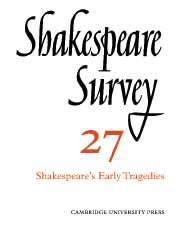Book contents
- Frontmatter
- Shakespeare’s Earliest Tragedies: ‘Titus Andronicus’ and ‘Romeo and Juliet’
- The Aesthetics of Mutilation in ‘Titus Andronicus’
- The Motif of Psychic Division in ‘Richard III’
- The Antic Disposition of Richard II
- The Prince of Denmark and Claudius’s Court
- ‘Hamlet’ and the ‘Moriae Encomium’
- The Relation of Henry V to Tamburlaine
- Shakespeare and the Puritan Dynamic
- Equity, ‘The Merchant of Venice’ and William Lambarde
- ‘Love’s Labour’s Won’ and the Occasion of ‘Much Ado’
- The Date and Production of ‘Timon’ Reconsidered
- Shakespeare, Her Majesty’s Players and Pembroke’s Men
- Judi dench talks to Gareth Lloyd Evans
- Shakespeare Straight and Crooked: A Review of the 1973 Season at Stratford
- The Year's Contributions to Shakespearian Study 1 Critical Studies
- 2 Shakespeare’s Life, Times, and Stage
- 3 Textual Studies
- Index
- Plate section
‘Love’s Labour’s Won’ and the Occasion of ‘Much Ado’
Published online by Cambridge University Press: 28 March 2007
- Frontmatter
- Shakespeare’s Earliest Tragedies: ‘Titus Andronicus’ and ‘Romeo and Juliet’
- The Aesthetics of Mutilation in ‘Titus Andronicus’
- The Motif of Psychic Division in ‘Richard III’
- The Antic Disposition of Richard II
- The Prince of Denmark and Claudius’s Court
- ‘Hamlet’ and the ‘Moriae Encomium’
- The Relation of Henry V to Tamburlaine
- Shakespeare and the Puritan Dynamic
- Equity, ‘The Merchant of Venice’ and William Lambarde
- ‘Love’s Labour’s Won’ and the Occasion of ‘Much Ado’
- The Date and Production of ‘Timon’ Reconsidered
- Shakespeare, Her Majesty’s Players and Pembroke’s Men
- Judi dench talks to Gareth Lloyd Evans
- Shakespeare Straight and Crooked: A Review of the 1973 Season at Stratford
- The Year's Contributions to Shakespearian Study 1 Critical Studies
- 2 Shakespeare’s Life, Times, and Stage
- 3 Textual Studies
- Index
- Plate section
Summary
That the title Much Ado About Nothing been associated with a pun — so that, in effect, something can come ex nihilo — has become a commonplace in Shakespearian scholarship; however, the word-play upon ‘noting’ and ‘nothing’ (as in the Don Pedro/Balthasar dialogue in act II) is seemingly too slight for considering that an entire play, or even its title, would have been built upon it. Though this word-play is enhanced through the added meaning of noting — that is, making notes in the ‘immediate context’ of sounding notes in music, but also in the ‘larger context’ of taking notes, or eavesdropping — I submit that the explanation is unsatisfactory for justifying the title, which may unfortunately retain the general impression of flippancy. I propose, however, a more agreeable solution which need not make the audience feel ‘taken in’ or embarrassed by seeming insincerity or flippancy: it is one that builds upon the inherent insouciance of the title, without having to apologize for it in the least. My view is that the title as we have it was originally the play’s subtitle. At some point, then, the main title got lost. If so, the lost title may have been Love’s Labour’s Won, for this is the only title of Shakespeare’s which we have without a play to to go with it from this period of his career. Since a number of Shakespeare’s other comedies have similarly ‘flippant’ subtitles, the interpretation here offered would not be setting a new precedent.
- Type
- Chapter
- Information
- Shakespeare Survey , pp. 105 - 110Publisher: Cambridge University PressPrint publication year: 1974
- 1
- Cited by



